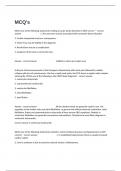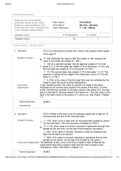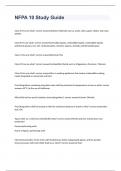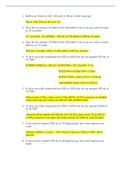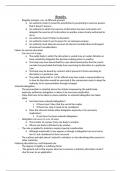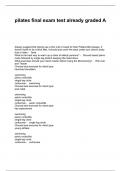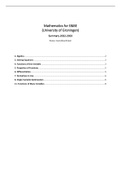Outcome D: Exploring Liability for Private Nuisance and Rylands v Fletcher
Private Nuisance
- The unlawful interference with a person’s use of enjoyment of land from neighbouring land.
- The interference will generally be due to intangible matters causing annoyance to a person, for example,
smell, smoke or noise.
- However, it can sometimes be physical interference, such as tree roots growing onto a neighbour’s land.
- The person who can take an action in nuisance is the person suffering from the nuisance and they must
have an interest in the land as an owner or tenant.
- An interest in land is when a person has to have a legal stake in the land affected, either as owner or
tenant. A member of the owner’s family will not have an interest in the land unless their name is on the
legal documents.
- The person who can be sued is the person causing the problem, whether or not they have interest in the
land.
- Private nuisance is all about reasonableness in the use of property.
- If the court decides that the action is reasonable, they will not find it a nuisance. If they find the action
unreasonable, it can be a nuisance.
-
Factors of reasonableness
- In order to decide whether an action causing the nuisance is reasonable or not the court will take various
factors into account.
- Locality and character of the neighbourhood - In Sturges v Bridgeman 1879 it was said that ‘what
would be a nuisance in Belgrave Square (an exclusive area in central London) would not be so in
Bermondsey (a commercial area by the River Thames)’ So if the problem is occurring in a
mixed-use area or an industrial area it is less likely to be considered a nuisance.
- The duration of the problem - the longer the action goes on, the more likely it is to be
unreasonable. However in Crown River Cruises v Kimbolton Fireworks Ltd 1996 a one off 20n
minute firework display was enough to amount to a nuisance
- The time of day - If the activity is being carried on in the evening or at night, it is more likely to be a
nuisance than if it is being carried out during the day.
- The social utility or usefulness of the action - if the action causing the nuisance is providing
employment or a social benefit to the area, it may be considered to be reasonable. However in
Adams v Ursell 1913 a popular fish and chip shop was found to be causing a nuisance due to
smells coming from it and was forced to close.
- Whether there is any malice present - malice is a deliberate act on the part of the person causing
the nuisance. In Christie v Davey 1893 a music teacher complained that her neighbour banged
trays on the wall in their terrace house to annoy her and to disrupt her while she was giving piano
lessons. His deliberate actions were motivated by bad feelings and the court found them to be
unreasonable.
Defences to a nuisance action
- Statutory authority - if permission for the use of the land has been given by the local authority, the action
may not be a nuisance. In Allen v Gulf Oil Refinery 1981 the claimant brought an action against the
nuisance for the smell, noise and vibration created by the oil refinery. Building the oil refinery was
authorised by an Act of Parliament. The defendant was not liable as it had a defence of statutory authority.
- Prescription - a defence in nuisance when the activity being complained about has been carried on for at
least 20 years. If the action has been carrying on for at least 20 years and there has been no complaint
between the parties at the time, then the defendant may be said to have a prescriptive right to continue. It
has to be between the same parties.
- If the claimant moves into an area where an action has been carried on previously by the defendant
without any complaint, then the defendant without any complaint, then the defendant cannot say that there
has been no problem previously and the claimant has only just moved into the area.
- It can be shown that the claimant or their property is particularly sensitive, then the action may not be a
nuisance. In Robinson v Kilvert 1889 if the person complaining about a nuisance is unduly sensitive, the
court will not find a nuisance proved.
Private Nuisance
- The unlawful interference with a person’s use of enjoyment of land from neighbouring land.
- The interference will generally be due to intangible matters causing annoyance to a person, for example,
smell, smoke or noise.
- However, it can sometimes be physical interference, such as tree roots growing onto a neighbour’s land.
- The person who can take an action in nuisance is the person suffering from the nuisance and they must
have an interest in the land as an owner or tenant.
- An interest in land is when a person has to have a legal stake in the land affected, either as owner or
tenant. A member of the owner’s family will not have an interest in the land unless their name is on the
legal documents.
- The person who can be sued is the person causing the problem, whether or not they have interest in the
land.
- Private nuisance is all about reasonableness in the use of property.
- If the court decides that the action is reasonable, they will not find it a nuisance. If they find the action
unreasonable, it can be a nuisance.
-
Factors of reasonableness
- In order to decide whether an action causing the nuisance is reasonable or not the court will take various
factors into account.
- Locality and character of the neighbourhood - In Sturges v Bridgeman 1879 it was said that ‘what
would be a nuisance in Belgrave Square (an exclusive area in central London) would not be so in
Bermondsey (a commercial area by the River Thames)’ So if the problem is occurring in a
mixed-use area or an industrial area it is less likely to be considered a nuisance.
- The duration of the problem - the longer the action goes on, the more likely it is to be
unreasonable. However in Crown River Cruises v Kimbolton Fireworks Ltd 1996 a one off 20n
minute firework display was enough to amount to a nuisance
- The time of day - If the activity is being carried on in the evening or at night, it is more likely to be a
nuisance than if it is being carried out during the day.
- The social utility or usefulness of the action - if the action causing the nuisance is providing
employment or a social benefit to the area, it may be considered to be reasonable. However in
Adams v Ursell 1913 a popular fish and chip shop was found to be causing a nuisance due to
smells coming from it and was forced to close.
- Whether there is any malice present - malice is a deliberate act on the part of the person causing
the nuisance. In Christie v Davey 1893 a music teacher complained that her neighbour banged
trays on the wall in their terrace house to annoy her and to disrupt her while she was giving piano
lessons. His deliberate actions were motivated by bad feelings and the court found them to be
unreasonable.
Defences to a nuisance action
- Statutory authority - if permission for the use of the land has been given by the local authority, the action
may not be a nuisance. In Allen v Gulf Oil Refinery 1981 the claimant brought an action against the
nuisance for the smell, noise and vibration created by the oil refinery. Building the oil refinery was
authorised by an Act of Parliament. The defendant was not liable as it had a defence of statutory authority.
- Prescription - a defence in nuisance when the activity being complained about has been carried on for at
least 20 years. If the action has been carrying on for at least 20 years and there has been no complaint
between the parties at the time, then the defendant may be said to have a prescriptive right to continue. It
has to be between the same parties.
- If the claimant moves into an area where an action has been carried on previously by the defendant
without any complaint, then the defendant without any complaint, then the defendant cannot say that there
has been no problem previously and the claimant has only just moved into the area.
- It can be shown that the claimant or their property is particularly sensitive, then the action may not be a
nuisance. In Robinson v Kilvert 1889 if the person complaining about a nuisance is unduly sensitive, the
court will not find a nuisance proved.

